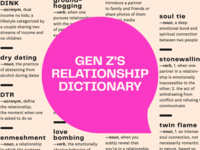What Is Ethical Non-Monogamy? Experts Explain ENM Relationships

We've grown up with plenty of depicitions of monogamy: riding off into the sunset with your Prince (or princess) Charming, the happily ever after, the idea of one person being your person… But as the world of dating and commitment evolves, once taboo relationship styles are becoming more mainstream and accepted—like the seemingly elusive ethical non-monogamy (ENM).
But what is ethical non-monogamy? And what does it mean to take part in an ENM relationship or an ENM marriage? We answer all of your burning questions ENM relationships, below.
Meet The Expert
To give us the lowdown on everything ENM, we teamed up with sexologist Shan Boodram—Bumble's sex and relationships expert and the resident dating coach on Netflix's Too Hot to Handle.
In this article:
- What Is ENM or Ethical Non-Monogamy?
- Examples of ENM relationship styles
- How Does ENM Compare To Other Relationship Types?
- How To Put The "E" In ENM
- How To Know If Ethical Non-Monogamy Is Right For You
What Is ENM or Ethical Non-Monogamy?
Simply put, ethical non-monogamy (or ENM for short) is a type of relationship commitment structure. Unlike traditional monogamy, ENM is when people in a committed relationship consent to romantic connections outside of that partnership. However, it's important to note that the term isn't a signifier of one type of relationship, but an umbrella term for different variations of non-monogamy.
As Boodram explains, "Ethical non-monogamy—aka consensual non-monogamy—is an umbrella term to describe all kinds of commitment structures that don't fall under the monogamous approach (one romantic and sexual interest at a time) to relating."
Examples of ENM relationship styles
- Polyamory
- Consensual non-monogamy
- Open relationships
- Swinging
It's safe to say that the ENM approach to relationships and dating has steadily been rising in popularity, too: According to a 2022 Bumble study, 42% of app members shared that they're approaching sex, intimacy and dating in a more open and exploratory way than the previous year. Additionally, one in six (16%) of American respondents have recently considered a non-monogamous relationship.
How Does ENM Compare To Other Relationship Types?
As mentioned above, ENM is an umbrella term to describe a whole host of relationships. But with so many different relationship types that fall under the category of ethical non-monogamy, it can feel confusing to differentiate them all at first.
If you're interested in exploring and learning if a relationship style might be for you, we've defined some non-monogamous relationship structures, below.
ENM vs. Polyamory
Polyamory falls under the ENM umbrella. The word translates to many (poly) loves (amor). "People who are polyamorous can love multiple people at once," Boodram explains. "This is also an umbrella term, as there are infinite ways people can practice polyamory."
Some people who practice polyamory are in a primary relationship with one person, but may have another serious and committed relationship. Others may practice solo-poly, which is when you have multiple loving relationship—but not one primary partner. Regardless of how someone practices it, polyamory can be a way to deeply explore your capacity for love.
ENM vs. Consensual Non-Monogamy
Like ENM, consensual non-monogamy is just another way of phrasing what ethical non-monogamy means and works off of: knowledge, honesty, agreement and consent with partner(s).
"These are oftentimes interchangeable terms as knowledge, agreement and consent are all key to having any kind of non-monogamous relationship," Boodram says.
ENM vs. Open Relationships
Open relationships is another category that falls under the ENM umbrella. According to Boodram, an open relationship refers to a commitment structure where there is a primary couple (like a married couple or committed partners who aren't married) who have outside romantic or sexual connections outside of their partnership.
These are usually viewed as secondary to their primary relationship.
ENM vs. Swinging
Another popular term under the umbrella of ENM which you may be more aware of is swinging. "Usually, this is where a couple engages in no-strings attached sexual experiences at the same time—but not necessarily together," Boodram says.
How To Put The "E" In ENM
You can't have ethical non-monogamy without the ethical portion. But what does it truly mean to be non-monogamous and ethical? Being ethical means that while you may see multiple people in a romantic or sexual way, every partner(s) should be on the same page and have full knowledge and consent toward the relationship style.
"If everyone isn't on the same page and don't have agency to shape the commitment structure to suit their needs, then it's not ethical," Boodram emphasizes.
Furthermore, being ethical means not only that everyone understands it, but also that everyone wants and consents to it.
To keep ethics in your relationship:
- Have two-way communication where both people in the relationship agree to ENM.
- If you're in a monogamous relationship and you want to discuss ENM with your partner, set time with them to discuss and share respectful conversation.
- Keep in mind that it may take multiple conversations to express your desires and fully understand your partner's needs.
- Remember that everyone involved should have the knowledge and consent of the decision.
How To Know If Ethical Non-Monogamy Is Right For You
Do you think ethical non-mongamy may be for you? Before venturing quickly into a new relationship style, it's important to do your research, have open communication with your parter and, most importantly, have self-awareness.
Some helpful questions to consider:
- Do you have the capacity to be attracted to more than one person at a time?
- Do you have the capacity to give your romantic partner(s) the option to explore their outside attractions?
- Do you experience compersion (the joy in seeing someone else happy even though you're not directly involved) when you think about your romantic partner with others—with or without feelings of jealousy?
- Do you have resources, examples, guides, conversation templates and educators you can use to support you on your ENM journey?
- Do you have the capacity to talk about your relationship structure, boundaries, and desires more than you may have in past monogamous connections?
If you can answer an enthusiastic yes to these, then, Boodram suggests, ENM may be right for you at this time.























